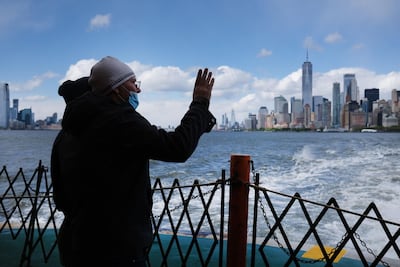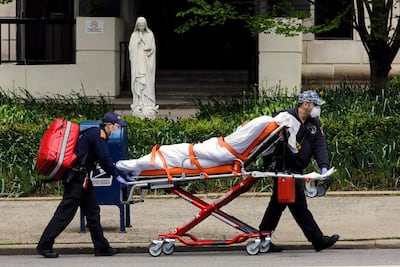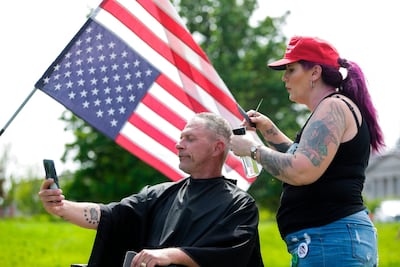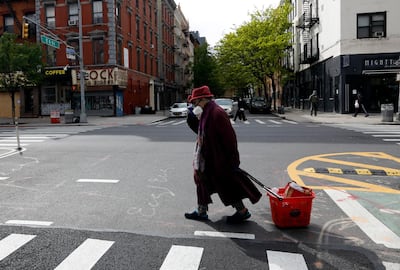For the second time, US President Donald Trump is about to make a huge bet against the power of the coronavirus. Earlier this year, as his officials fretted, he gambled that "everything will work out fine."
Now, he appears determined to push the US into quickly reviving normal life.
In January, he received nearly daily warnings that the virus was spreading with potentially disastrous consequences.
Always focused on the economy, and with the Dow Jones industrial average approaching the coveted 30,000 benchmark, Mr Trump assured Americans, investors, and himself that there was nothing to worry about.
When the pandemic struck in March, the resulting lack of preparation and planning helped ensure the impact of the pandemic reached almost unimaginable proportions.
Despite a thoroughgoing campaign of social distancing, closure of public places and other mitigation efforts, the US has among the world’s highest Covid-19 toll, in both absolute and per capita terms.
Americans, constituting a mere 5 per cent of the world’s population, account for a whopping 33 per cent of confirmed cases.
Almost 80,000 have died, at a daily rate six times higher than the global average.
And with the exception of the New York City metropolitan area, the spread of the virus appears to be accelerating, not slowing.
The US performed spectacularly badly because of the lack of a coordinated national response.
Mr Trump insisted that states alone are responsible for all major decisions and key tasks, including testing, securing supplies and equipment such as ventilators.

Mr Trump did flex his mighty federal government muscles by ordering virus-plagued meat processing facilities to stay open to avoid any threat to the hamburger supply.
But there has been no comparable mobilisation on the production of tests, personal protective equipment or other goods that lack the overriding national importance of meat.
Now Mr Trump appears ready to spin the wheel again by reopening society without any of the requisite benchmarks met or basic systems in place.

The impulse is understandable. Unless Mr Trump can oversee a quick economic turnaround, he seems unlikely to beat former US vice president Joe Biden in November.
The presumptive Democratic nominee, despite being virtually invisible in recent months, is winning handily in most polls, especially in several key swing states.
And Mr Trump's support among senior citizens, disproportionately susceptible to the virus, is collapsing.
True to form, Mr Trump has cultivated an atmosphere of deeply political division in which reopening the country is cast as a conservative and Republican position, whereas caution, data-driven decision-making, and even regard for life, have apparently become liberal and Democratic approaches.

Any sensible person must be deeply concerned about the devastating economic consequences of mitigation as well as the public health catastrophe caused by the pandemic.
Unemployment figures are staggering, reaching levels not seen since the Great Depression almost 100 years ago. It may take years, or even decades, to reverse the damage of mere months of lockdown.
Yet Mr Trump is promoting a narrative that seems to pit public health against the economy when instead they are inextricably interdependent.
Even if states try to force people back to work by cutting off their unemployment and other benefits, consumer spending will not rebound unless the public feels safe patronising businesses.
People cannot be ordered to be productive and spend confidently.
Meanwhile, epidemiologists warn that loosening restrictions without adequate preparations could result in another round of infections and tens of thousands of additional deaths.
Under current circumstances the move makes little apparent sense. None of the states Mr Trump is encouraging to loosen restrictions meet the standards established by his own coronavirus task force.
And the White House last week blocked a more detailed set of reopening guidelines from the Centers for Disease Control and Prevention, reportedly because they demonstrate how unprepared much of the country remains.
There is no national testing programme or remotely adequate state-based structure, which would probably mean between three million to 25 million tests a week.
There is no national or state contact tracing system. There is not even a plan or structure for creating them.
With a little imagination and initiative, though, the unemployment and contact tracing crises could be addressed simultaneously through a national programme to rapidly employ hundreds of thousands of coronavirus fighters.
But Republicans are allergic to anything that smacks of an expanded and effective public sector.
So, the country will not even be able to tell how well or badly the upcoming re-opening gambit is going until it is too late.
Mr Trump never made any effort to create serious testing and tracing programmes and appears to have given up entirely, surrendering that key territory to “the invisible enemy” without so much as a fight.
Instead, Mr Trump is battling to change attitudes by communicating that social distancing and other basic precautions are overrated and the best remedy is a bold return to normalcy.
He calls the public "warriors," prepared to risk their lives to return to work. The essential message is clear: only cowards and traitors want to mitigate. Real Americans, and especially real men, are ready to die for the economy.
This narrative was impeccably enacted when Mr Trump toured a mask factory without wearing a mask and with the song Live and Let Die blaring in the background.
He has started to insist testing "isn't necessary" and "somewhat overrated." Still, no one is allowed near him without being immediately tested and he appeared astonished that several White House staff recently tested positive.
He has taken to suggesting that the death tolls are exaggerated, and has resurrected the mantra that the virus will soon disappear. The White House now often refers to the pandemic in the past tense.
The last time they sounded like this, the coronavirus was spreading uncontrolled, and largely undetected throughout society.
Mr Trump gambled big earlier this year. He lost hugely. Those 80,000 Americans, so far, have paid the price. He is about to throw the dice again. This time, the stakes for everyone are a lot higher.
Hussein Ibish is a senior resident scholar at the Arab Gulf States Institute in Washington
Follow The National's Opinion section on Twitter



